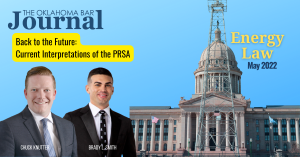Oklahoma Bar Journal
Back to the Future: Current Interpretations of the PRSA
By Chuck Knutter & Brady L. Smith
 The Oklahoma Production Revenue Standards Act (PRSA), which was enacted in 1980 and is currently codified at 52 O.S. §570 et. seq., addresses the payment of proceeds from oil and gas production in Oklahoma. Over the 40 years since its enactment, various portions of the PRSA have faced countless arguments over its interpretation. However, the recent decision of Cline v. Sunoco has provided the greatest clarity to date on the interpretation and implementation of the PRSA. This decision, coupled with a new generation of policymakers, has brought about calls to alter the PRSA.1 This article is intended to provide a look at the original underlying purpose of the PRSA and the current status of interpretation of the PRSA to all stakeholders involved and any future discussions regarding any proposed future amendments to the PRSA.
The Oklahoma Production Revenue Standards Act (PRSA), which was enacted in 1980 and is currently codified at 52 O.S. §570 et. seq., addresses the payment of proceeds from oil and gas production in Oklahoma. Over the 40 years since its enactment, various portions of the PRSA have faced countless arguments over its interpretation. However, the recent decision of Cline v. Sunoco has provided the greatest clarity to date on the interpretation and implementation of the PRSA. This decision, coupled with a new generation of policymakers, has brought about calls to alter the PRSA.1 This article is intended to provide a look at the original underlying purpose of the PRSA and the current status of interpretation of the PRSA to all stakeholders involved and any future discussions regarding any proposed future amendments to the PRSA.
THE INTEREST OWNER/OPERATOR RELATIONSHIP

Fizkes | #406490754 | stock.adobe.com
Under Oklahoma law, mineral owners subject to an oil or gas lease or a pooling order are entitled to receive a cost-free portion of the proceeds from the sale of oil or gas produced from their mineral interests. The oil and gas company responsible for operating the well is normally in charge of marketing production from the well and distributing production proceeds to the non-operating owners in the well. While other arrangements, like gas balancing agreements, have been used by non-operating working interest owners to separately market their own share of production, the vast majority of non-operating owners have their share of oil and gas marketed by the operator of the well. In some instances, the first purchaser of oil or gas production takes on the responsibility of remitting proceeds to non-operating owners, which the PRSA specifically addresses.2 Further, as production units continue to grow in size, increasing the total number of owners in any given well, this arrangement seems likely to become even more prevalent in the future. But this seemingly simple arrangement between the operator and non-operating owners has become more tedious. External forces have incentivized oil and gas companies to delay payment, and the evolution of the oil and gas industry has increased the work an operator must do in order to satisfy their duty.
THE HISTORICAL PROBLEM
The legislative purpose for the PRSA has been well documented by courts since the statute’s enactment. “In enacting [the PRSA], the Legislature has expressed its intent that it shall be the public policy in Oklahoma for royalty owners to receive prompt payment from the sale of oil and gas products.”3 “The obvious overriding purpose of the Act is to ensure that royalty owners are timely paid their share of the proceeds.”4The PRSA’s payment timelines were aimed at remedying historical abuses by operators that refused to pay proceeds to royalty owners in a timely fashion while the operator reaped benefits (including high interest rates) during the interim. “For decades, oil and gas producers or first purchasers would for various reasons delay or decline to distribute the proceeds from the first sale to interest owners and use those funds for their own purposes until they were ultimately distributed, if at all.”5 One reason for such behavior arose “in the inflationary times of the late 1970s and early 1980s when the prime interest rate soared to 21.5%, there was a great incentive to delay royalty payments” and “many producers routinely suspended royalties and delayed payment for many months and even years to take advantage of the interest earned during the float between the receipt of sales proceeds and disbursement of royalties.”6 Such practices deprived owners of the time value of their money and led to an increase in lawsuits by various interest owners against operators engaged in such practices.7
THE STATUTORY SOLUTION
To curb these abuses, the PRSA imposed specific time periods within which the holder of proceeds had to fulfill its duty to the interest owners by paying each of them their share of production proceeds.8 It provided that “proceeds from the sale of oil or gas production” must be paid “to persons legally entitled thereto” within “six (6) months after the date of first sale” and “thereafter not later than the last day of the second succeeding month after the end of the month within which such production is sold.”9
To incentivize compliance with these time periods – or at least to provide non-operating owners with commercially reasonable compensation should its terms be violated – the PRSA provides that when all or a portion of the proceeds are not timely paid, “that portion not timely paid shall earn interest at the rate of twelve percent (12%) per annum to be compounded annually, calculated from the end of the month in which such production is sold until the day paid.”10 The PRSA also provides that if the holder of proceeds is not paying the non-operating owner because title to its interest is not marketable, the statutory interest rate applied to the proceeds is the prime interest rate as reported in the Wall Street Journal.11 This language makes up the core of the PRSA as it incentivizes holders of proceeds to pay non-operating owners in a timely fashion and assist interest owners who may have a title defect in taking the steps necessary to cure the defect so that it may be paid its share of production proceeds.
While often framed as a one-sided statute aimed at punishing holders that fail to timely pay proceeds, the PRSA contains various provisions designed to protect holders. For example, Section 570.10(B)(3) includes longer time periods for payment when the amount owed to the interest owners is small. Amounts between $10 and $100 may be remitted annually, so long as certain notice is provided to owners.12 Amounts less than $10 do not have to be remitted to the owners entitled them until the well ceases producing.13 Further, while rarely used, the PRSA provides holders with a way to cut off their liability for interest entirely.
A factual scenario that arises for holders is their inability to pay proceeds in a timely fashion because the non-operating owner does not have marketable title to these interests. This scenario is clearly addressed by the current version of the PRSA. Section 570.10(D)(2)(b) provides:
Where marketability has remained uncured, or the holder has not been provided acceptable affidavit of death and heirship in conformity with Section 67 of Title 16 of the Oklahoma Statutes, for a period of one hundred twenty (120) days from the date payment is due under this section, any person claiming to own the right to receive proceeds which have not been paid because of unmarketable title may require the holder of such proceeds, or the holder of such proceeds may elect, to interplead the proceeds and all accrued interest into court for a determination of the persons legally entitled thereto. Upon payment into court the holder of such proceeds shall be relieved of any further liability for the proper payment of such proceeds and interest thereon.
This provision is important because it provides the holder a way to avoid paying interest while holding the proceeds and gives the non-operating owner a means of protecting proceeds held by the holder. Rather than the holder suspending proceeds indefinitely because of a marketable title defect – thereby incurring interest until the title is cured and the proceeds can be paid – the holder may choose to interplead the proceeds into court for a determination of their ownership. Likewise, a non-operating owner may determine it does not want the holder sitting on its proceeds and has the option to require the holder to interplead the proceeds into court.
NEW CHALLENGES
On its face, the rules set out in the PRSA seem pretty straightforward, and the only real changes to the PRSA since its inception have been for the benefit of holders. These authors are often asked the question of why, over 40 years after its enactment, holders have difficulty complying with it. To us, the answer has less to do with the language of the PRSA and more to do with the modern realities of the oil and gas industry.

Maren Winter | #190306357 | stock.adobe.com
First, some operators and purchasers are aware of their duty under the PRSA but simply ignore it or make a calculated business risk to not automatically pay interest. A recent federal case highlighted that many of the abuses the PRSA was meant to curb still persist in the industry. In Cline, Sunoco was the purchaser and distributor of production proceeds, and the case dealt with its failure to pay interest on late-paid proceeds. Sonoco knew the PRSA mandated that it pay interest but “adopted a policy only to pay if the well owner requests an interest payment.”14 Rather than comply with its obligations under the PRSA, “Sunoco simply [kept] the money for its own use, knowing two things: that most owners will not request interest, and that eventually the owners’ potential claims will die at the hands of the statute of limitations. And when that happens, Sunoco will have irrevocably pocketed the money.”15
Second, it is easy to paint the duty of the operator to pay proceeds to interest owners in simplistic terms. Over the years, however, practical challenges of meeting the duties codified by the PRSA have grown more difficult. The complexity of this task is driven by at least three factors. First, as technology has improved, particularly with the advent of horizontal drilling, the area developed with a single wellbore has greatly increased. In the past, vertical wells were commonly assigned drilling and spacing units of 40, 80 or even 160 acres. Now, with the advent of horizontal drilling, 640 and 1,280-acre production units are now the norms.
Third, the continuous fractionalization of oil and gas interests means the number of parties entitled to receive a portion of the proceeds of production from any given acre of minerals is also growing. Shortly after statehood, each section of land in Oklahoma was generally held by a handful of parties, with many parties having received grants or allotments of 160-acre tracts. Over the last century, these tracts have become subdivided into increasingly smaller parcels. In addition, the descent and distribution of non-operating interests has also played a large role in expanding the number of interest owners in Oklahoma. Since the fractionalized ownership of minerals presents fewer complications than the fractionalized ownership of the surface estate, the passage of minerals through descent and distribution has exponentially expanded the number of owners in many tracts of minerals in the state. Since many mineral interest owners lease their minerals to working interest owners who partner with the operator in the development of the acreage, the number of working interest owners has also expanded.
As any oil and gas title attorney will tell you, the increasing number of owners (each with their own distinct chain of title) makes the task of identifying each owner and their precise interest in a modern horizontal well increasingly time consuming, costly and difficult. Similarly, the job of keeping track of the changes in ownership of so many interests has also become increasingly difficult.
Last, operators have increased their use of Oklahoma’s force pooling statute, 52 O.S. §٨٧.١. Historically, the relationship between the operator and other parties entitled to production from the well was governed by private contracts. Mineral owners usually executed the oil and gas leases with an oil company, which increased the odds of a well’s operator having a good address for the mineral owners. Similarly, the minerals owners, generally having recently executed an oil and gas lease, were incentivized to keep the operator notified of their current address. Joint operating agreements – historically used to govern the relationship between the operator and other working interest owners – are relics of a bygone age in Oklahoma, as operators rarely, if ever, attempt to enter into a joint operating agreement prior to initiating force pooling proceedings.
However, with pooling orders, the situation can be quite different. The operator sends well proposal letters to all the addresses it can locate either through title records or digital means of locating owners. If the operator does not receive a response to these proposals, they generally use the same address for notice of the pooling proceeding, which is supplemented with publication notice. Whether the non-
operating owner actually receives the notice or just ignores it, its interest will be pooled without them having to take specific action to establish communications with oil the company about their current and future addresses. This lack of communication is exacerbated over time as a particular well may change hands from one operator to another. The proceeds attributable to this owner are likely to be held in suspense until the operator locates the interest owner, chooses to interplead the proceeds or, more likely, escheats these funds to the appropriate authority.
These three issues demonstrate that as the work required by an operator to fulfill its duty to the non-operating owners has grown, it has created more opportunities for errors, as well as more incentives for operators to delay the timely payment of production proceeds. However, better practices incorporating technology can be used to solve this problem. Compared to 1980, when the PRSA was enacted, advancements in computer technology, the development of specialized software and the internet have made all these problems easily surmountable by operators who are simply willing to devote the resources in technology and manpower necessary to fulfill their obligations under the PRSA.
INTERPRETATION OF THE PRSA
The PRSA was enacted “to ensure that those entitled to royalty payments would receive proceeds in a timely fashion.”16 In passing the PRSA, the Legislature made clear that Oklahoma has a public policy “for royalty owners to receive prompt payment from the sale of oil and gas products.”17
Recently, multiple lawsuits, both individual cases and class actions, have been filed against operators and first purchasers, highlighting the continued abuse of suspense accounts and violations of the PRSA. The most notable of these lawsuits, and the focus of this article, is Cline v. Sunoco, Inc. In Sunoco, the Eastern District of Oklahoma awarded 1) actual damages of over $75 million in unpaid interest as well as $75 million in punitive damages based on Sunoco intentionally withholding that interest “until … the owner finally asked for the interest.”18 While the award in Sunoco is eyepopping, the rulings the court made regarding interpretation of the PRSA have far-reaching consequences for operators and non-operating owners alike.
TIMING OF INTEREST PAYMENTS
Sunoco raised an oft-asked question regarding interpretation of the PRSA: When is interest on payments of oil and gas proceeds due? Cline argued that Sunoco was required to pay interest on a late payment at the time the principal payment was made.19 Sunoco, on the other hand, claimed it was liable for interest when late payments were made but argued the PRSA did “not require it to pay that interest at the same time it makes the late payment.”20
The Sunoco court ruled, “The plain language of §570.10 of the PRSA requires Sunoco to pay interest at the same time it makes a late payment.”21 It reasoned that, “In §570.10, the Oklahoma Legislature … set forth a deadline for Sunoco to pay proceeds to interest owners” and that “requiring automatic payment of statutory interest give full force and effect to the remaining provision of §570.10, which set forth a timeframe to pay proceeds and a consequence for paying the proceeds late.”22
UNMARKETABLE TITLE
Under the PRSA, all untimely payments accrue 12% interest “unless the reason for nonpayment is because the title is unmarketable.”23 If the title is unmarketable, proceeds earn interest at a lower interest rate.24 However, for many years, defendants in cases alleging that interest is owed under the PRSA have sought to force plaintiffs to demonstrate that their title was marketable prior to agreeing that 12% interest was warranted. However, when Sunoco raised this argument, the court relied on Oklahoma’s rules for statutory interpretation to hold that the PRSA considered 12% interest the default interest rate to be applied to proceeds not timely paid, and the lower interest rate was an exception to this general rule.25Having recognized that unmarketability of title to an interest is the method for triggering an exception to the 12% interest rate, the court also recognized, “Unmarketability is, in essence, an affirmative defense.”26 Since the burden of proving affirmative defenses rests with the defendant raising them, the court reasoned that the burden of proving that a title to an interest is unmarketable and the lower interest rate category applies falls on the holder
of the proceeds rather than the royalty owner attempting to
collect them.27
DIVISION ORDER NOT REQUIRED FOR PAYMENT
Sunoco also brought to light another common misconception about the PRSA. Over the years, many operators have refused to pay proceeds to owners who have failed to return division orders. Similarly, Sunoco had refused to pay Cline because Cline had not signed a division order.28 However, the Sunoco court recognized this was not an excuse because the Oklahoma Supreme Court has already ruled, “The requirement that lessors execute division orders before receiving royalty payments conflicts with the spirit and letter of the [PRSA] and is violative of the public policy intended to be promoted throughits enactment – prompt payment to royalty owners of proceeds from the sale of oil or gas.”29
The argument raised by Sunoco and others has always been to shift the burden of determining a royalty owner’s decimal interest to the royalty owner. This is not an inconsequential burden shift. In order for a non-operating owner to properly certify a decimal interest, it must have the following information: net acres of leasehold/
mineral interest, net revenue interest, unit size and, in the case of multi-unit wells, the wellbore allocation percentage from final orders of the Oklahoma Corporation Commission. All of this information is easily accessible to a holder but can be difficult for some non-operating interest owners to obtain. It makes practical sense to place this burden on the holder of proceeds as, “The disparities in economic power between oil producers or first purchasers and royalty or mineral interest owners is often very wide.”30
WRITTEN INTEREST DEMAND REQUIRED
Sunoco also clarified that interest under the PRSA is due automatically on late payments without any requirement that a non-operating owner demands it. This notion that a demand is required before interest is owed has been batted around in the court system for many years. Holders who have failed to automatically pay interest have faced both individual and class action claims seeking unpaid interest. In Sunoco,the court held, “The PRSA does not require interest owners to demand payment to receive royalty proceeds.”31 The court relied heavily on the Oklahoma Supreme Court’s opinion in Pummill v. Hancock Exploration, LLC, quoting it for the proposition that, “The plain language of this statute imposes an obligation to include interest on late payments regardless of whether the royalty owners make demand for such interest.” However, the Sunoco court did not simply accept the Oklahoma Supreme Court’s decision on its face. It also recognized that evidence was presented at trial that over 1.5 million late payments were at issue, yet Sunoco did “not get many requests for interest each year.”32 Sunoco, like most holders, knew that most owners will never know to request interest and will end up keeping this money for its own use.33
HOW COMPOUND INTEREST IS CALCULATED
If a holder fails to make paymentwithin the time period provided for in the PRSA, the interest is “to be compounded annually, calculated from the end of the month in which such production is sold until the day paid.”34 However, Sunoco claimed that once it made a late payment to an interest owner, statutory interest stopped accruing.35 The idea being that once the principal had been paid, even without interest, the unpaid interest sum could not bear interest.36 Sunoco, like many defendants before it, referred to this category of Cline’s damages as “interest on interest.”37
The court cut this argument down by recognizing that Sunoco was simply mischaracterizing compound interest.38 It explained, “Compound interest is a common feature in investments and means simply that interest becomes part of the principal and therefore earns interest.”39 This recognition that the interest owed to the royalty owner becomes a part of the principal means it is also entitled to interest under the PRSA. Finally, the court pointed out it had already decided this issue in a prior case, quoting its own opinion in Cockerell Oil Props, 2020 U.S. Dist. Lexis 77967, that held, “The plain language of the PRSA ‘provides for compounding interest until the full amount – the proceeds due and the accrued interest –
are paid in accordance with the terms of the statute.’”
THE FUTURE OF THE PRSA
Sunoco is the latest case to interpret the PRSA, and the clarifications it made to the understanding of the PRSA will have lasting impacts on royalty owners and the holder of oil and gas proceeds alike. Such clarifications have already brought calls to change the PRSA, which will undoubtedly continue. As the oil and gas industry of this state evolves, so too does the relationship between oil and gas operators and their royalty owners. However, it is important that we never forget the historical abuses that led to the enactment of the PRSA, as changes are considered by the Legislature.
ABOUT THE AUTHORS
 Chuck Knutter is an attorney with Moricoli, Kellogg & Gleason PC. His practice focuses primarily on oil and gas litigation. Mr. Knutter received his J.D. from the OU College of Law.
Chuck Knutter is an attorney with Moricoli, Kellogg & Gleason PC. His practice focuses primarily on oil and gas litigation. Mr. Knutter received his J.D. from the OU College of Law.

Brady L. Smith is the founder of Brady Smith Law PLLC. His practice focuses primarily on oil and gas law, including litigation, lease cancelation, contract negotiation and royalty payment disputes. Mr. Smith received his J.D. with honors from the OCU School of Law.
- See Senate Bill 1524.
- 52 O.S. 570.10(E)(1).
- Hull v. Sun Refining & Mktg. Co., 1989 OK 168, ¶14, 789 P.2d 1272, 1279.
- Krug v. Helmerich & Payne, Inc., 2015 OK 74, ¶20, 362 P.3d 205, 214.
- 2015 OK AG 6, ¶2 (citing Si M. Bondurant, “To Have and to Hold: The Use and Abuse of Oil and Gas Suspense Accounts,” 31 Okla. City U. L. Rev. 1, 4 (2006)).
- Id.
- For the purposes of this article the terms “non-operating interest owners” and “non-operating owners” mean all parties, other than the operator, who are entitled to receive production from an oil or gas well. This term encompasses the owners of royalty interest, overriding royalty interests, non-operating working interest owners and any party entitled to a portion of oil or gas proceeds created by any other conveyance or instrument.
- See 52 O.S. §570.10(B)(1).
- Id.
- Id. §570.10(D).
- Id.
- Id.
- Id.
- Cline v. Sunoco, Inc., 479 F. Supp. 3d 1148, 1154 (E.D. Okla. 2020).
- Id.
- Hull v. Sun Ref. & Mktg. Co., 1989 OK 168, ¶14, 789 P.2d 1272, 1279.
- Id.
- Cline, 479 F. Supp. 3d 1148, 1178, 1181.
- Cline v. Sunoco, Inc., 2019 U.S. Dist. LEXIS 212587, at *9.
- Id.
- Id. at *12.
- Id. at *15.
- 2015 OK AG 6; Hull v. Sun Ref. & Mktg. Co., 1989 OK 168, ¶10, 789 P.2d 1272, 1277.
- 52 O.S. §570.10(D)(2)(b).
- Cline v. Sunoco, Inc., 479 F. Supp. 3d 1148, 1171.
- Id.
- Cline v. Sunoco, Inc., 479 F. Supp. 3d 1148, 1172.
- Cline v. Sunoco, Inc., 479 F. Supp. 3d 1148, 1160.
- Hull v. Sun Refining and Mktg. Co., 789 P.2d 1272, 1279 (Okla. 1989).
- 2015 OK AG 6, ¶9.
- Cline, 479 F. Supp. 3d at 1180.
- Cline, 479 F. Supp. 3d at 1180.
- Cline, 479 F. Supp. 3d at 1155.
- 52 O.S. §570.10(D)(1).
- Cline, 479 F. Supp. 3d at 1175.
- Id.
- Id.
- Id.
- Id.
Oklahoma Bar Journal – OBJ 93 Vol 5 (May 2022)
